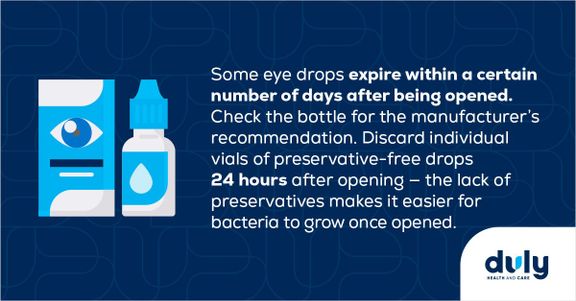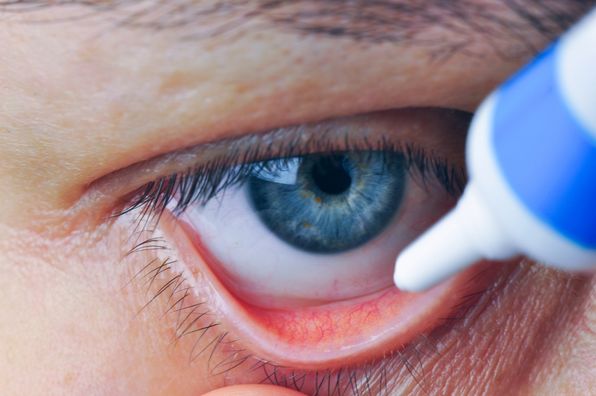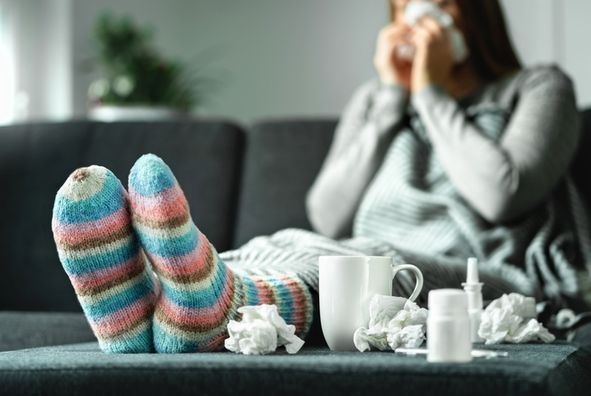Here’s what may be happening when your eye drops don’t help.
You’ve been diligently using your eye drops. You’ve followed the directions from your eye doctor and those on the package. But the results aren’t what you expected.
Eye drops can be used to manage a number of different eye problems, like itching, redness, or dryness. They can reduce symptoms of various conditions such as allergies and cure eye infections. While drops can be highly effective, they don’t always work in the way you might expect. In some cases, you may find that your symptoms are lingering, or even getting worse. And now, you may be wondering, “What exactly is happening?”
Here are 5 reasons why your drops may not be doing the trick — and what you can do about it.
1. They’re just not the right type of drops for you.
There isn’t a one-size-fits-all solution to eye drops. If your eye drops aren’t working, the key may be as simple as switching to a new one.
There are several reasons why one type of drop may work better than the others, even if they all promise to treat the same symptoms:
- You are not treating the cause of your symptoms. For example, you are using red eye relief drops; when what you need are artificial tears (lubricant eye drops) or allergy relief drops.
- Each brand of eye drops contains different ingredients, and your eyes might not tolerate certain ingredients well.
- Some drops have preservatives, which make them last longer and help prevent infection. But preservatives can damage the surface of your cornea (clear outer layer located at the front of your eye), irritating your eyes. If you use drops more than four times a day or have moderate or severe red eye, you may want to try a drop that doesn’t contain preservatives.
- Not all drops are contact lens-friendly. Look for products that are specifically designed for contact wearers.
Questions about eye drops? Schedule an appointment with a Duly Health and Care ophthalmologist or optometrist.
2. You’ve overused redness eye drops.
Most over-the-counter eye drops used to treat red eyes contain the decongestant tetrahydrozoline. They act quickly and effectively to reduce red eyes by decreasing swelling of the blood vessels in your eyes. This might seem like a miracle for people with chronic redness, but there is a catch. They are not always treating the root cause of your red eyes, and eye drops with decongestants should not be used long-term.
The decrease in swelling is only temporary. Once the drops wear off, the swelling can return and cause “rebound redness” — your eyes become red again, possibly even worse than before. This won’t necessarily happen every time, but it becomes a risk when you use the drops too often.
Some newer red eye relief drops use brimonidine rather than tetrahydrozoline. They have a smaller risk of rebound redness, but they should still be used with caution. Brimonidine drops may cover up redness that’s caused by eye diseases or infections, like pink eye. It’s important to determine the true cause of your red eyes to treat it appropriately. Before using these drops on a long-term basis, it’s a good idea to get the redness checked out by your ophthalmologist or optometrist.
Also read: Should I See an Optometrist or Ophthalmologist?
3. You’re using eye drops past their expiration date.
It can be tempting to stretch the life of your eye drops past their expiration date, especially if the bottle was never even opened. Eye drops can have a higher risk of complications if used after the expiration date compared to other medications. So, it’s better to be a little wasteful and replace your old drops with new drops.
Over time, the chemicals in eye drops can break down. There are two main issues when this occurs:
- The drops won’t be as effective.
- The chemicals could turn into harmful substances and contaminate the drops. This could lead to irritation, redness, blurry vision, and even serious eye infections.
Even if you’re far from the expiration date, keep tabs on when you first opened the bottle.

4. Your eye drops could be causing an infection.
Once drops are open, there is a possibility of bacteria growing on the bottle and contaminating the drops. Eye drops that contain preservatives can ward off bacteria, so opt for those (unless the preservatives irritate your eyes more).
An infection could also be the result of the tip of the bottle coming into contact with your eyes. When you’re putting drops in, be careful to apply the drop from a short distance rather than poking the bottle directly onto the surface of your eye. Also, don’t let anything else come into contact with the tip of the bottle. If something does, clean the tip with alcohol and let it air-dry, or just throw the bottle out.
In some cases, it might not be the result of the drops themselves. Putting drops in requires pulling your eyelid down. If your fingers accidentally touch your eyes — especially if you didn’t wash them right before — you run the risk of infection.
5. You’re using over-the-counter drops, but you need something more.
Oftentimes, an over-the-counter rewetting or redness drop will take care of the problem. But sometimes, they aren’t the right treatment.
You might just need a different medication. For example, if you have allergic conjunctivitis (itchy, red eyes due to allergies), over-the-counter drops might not be strong enough. You may need your provider to prescribe stronger allergy drops.
Or you might be treating the wrong problem altogether. You might think that redness is due to seasonal allergies, but it could actually be a sign of infection or inflammation, in some cases glaucoma — an eye disease that, if left untreated, can eventually cause blindness.
Also read: 10 Ways to Maintain Your Eye Health
If your eye drops aren’t working or you’re not sure which to use, reach out to your eye doctor. And if you have long-lasting or severe symptoms, schedule an appointment to get your eyes checked. Whether you need over-the-counter drops, prescription drops, or something else entirely, your provider can make sure that your eyes are healthy.
Health Topics:








